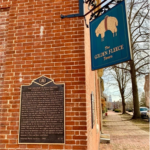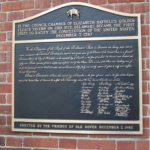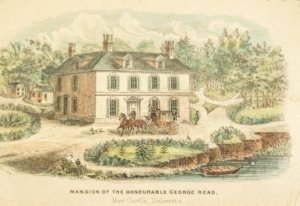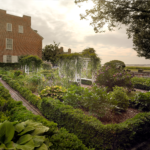We are very proud of our small chapter and its accomplishments thus far. Comprised currently of 25 members, the Battell and Read Chapter, NSDAR, is a sterling example of women of different ages, from different backgrounds, celebrating patriotism, promoting the education of America’s children, and preserving our history. We are dedicated, enthusiastic, joyful, and a whole lot of fun!
While it is true that genealogy and lineage are central to the existence of the DAR, it is the chapter’s mission and our strong friendships that make the Battell and Read Chapter, NSDAR, a group to which we all love to belong.
The chapter generally meets monthly from September through June. If you are interested in attending a meeting to see us in action or catch us out at a community event, please contact us.
Our Namesakes
This name honors the historic contributions of two Delaware Daughters, while proudly displaying the face of today’s DAR. Elizabeth Empson Battell and Gertrude Ross Till Read came from different counties, Kent and New Castle, and diverse socio-economic classes, but both worked tirelessly to support and keep Delaware united in the cause for independence. Though very different, they were clearly empowered to do what needed to be done and made significant contributions to the history of the American Revolution in Delaware.
 Elizabeth Empson Battell is known as the “Godmother of the First State.” Battell ran the Golden Fleece Tavern on Dover Green from 1777 until 1792. She and her husband, French Battell, a Quartermaster in the local militia, ran it as partners throughout the American Revolutionary War until his death in 1781.
Elizabeth Empson Battell is known as the “Godmother of the First State.” Battell ran the Golden Fleece Tavern on Dover Green from 1777 until 1792. She and her husband, French Battell, a Quartermaster in the local militia, ran it as partners throughout the American Revolutionary War until his death in 1781.
The Golden Fleece Tavern, sometimes called Battell’s Tavern, had a long history as a place of political importance. During the American Revolutionary War, the tavern served as a vital point of communication exchange. It also hosted the meetings of the Committee of Inspection and Observation, and when the state government moved from New Castle to Dover in 1777, the tavern hosted the meetings of the assembly’s upper house until the state house was completed in 1791.

In 1787, when 30 delegates from around the state met to review the Constitution put forth by the Philadelphia Convention, they did so at the Golden Fleece Tavern. When it was unanimously approved on December 7, 1787, making Delaware the First State, it occurred under Battell’s stewardship. The legislatures, in their excitement to spread the news about statehood, skipped out on the bill. The unpaid invoice is in the Delaware State Archives, and a copy hangs in the modern incarnation of the Golden Fleece. In 1790, delegates also ratified the Bill of Rights at the tavern.
Gertrude Ross was born in 1733, the daughter of Reverend George Ross, who was for more than half a century a clergyman of Newcastle, Delaware. Gertrude was well educated by her father, beyond the common lot of most girls of her day, even in educated families. It is said, “her person was beautiful, her manners elegant, and her piety exemplary.” She was the sister of George Ross, a signer of the Declaration of Independence, and half-sister of John Ross, an eminent lawyer at the Philadelphia Bar.
On January 11, 1763, George Read married Gertrude Ross Till, the widowed sister of future signer George Ross, at Emanuel Church, New Castle County, Delaware. There were four children born to the Reads: George Jr., born in 1765, was US District Attorney for Delaware for thirty years, receiving his first appointment from George Washington; William, born in 1767, was Consul-General for Naples at Philadelphia for many years; John, born in 1769, was a prominent member of the Philadelphia Bar and Judge of the Superior Court of Pennsylvania; Mary, born 1770, their only daughter.

Gertrude Read seems to have been admirably fitted to be the life companion of the public-spirited and patriotic young man she married. During the American Revolutionary War, she was constantly separated from her husband because of his service to his country. She suffered considerably and was often compelled to flee from the British at a moment’s notice. But she was never dejected or complaining; on the contrary, she encouraged her husband in every possible way, not only by word but by the cheerful manner with which she bore the hardships and burdens.
Gertrude was noted for her fondness for horticulture and enjoyed the profusion of flowers, especially tulips, which grew in the extensive garden of their old-fashioned mansion in New Castle. There she spent most of her life, except for the short periods when she was forced to take her family to Wilmington or Philadelphia during the American Revolutionary War.
 Gertrude Ross Till Read died on September 2, 1802, at home in New Castle, Delaware.
Gertrude Ross Till Read died on September 2, 1802, at home in New Castle, Delaware.
Please feel free to contact us if you have any questions about our meeting schedule or meetings in general.

